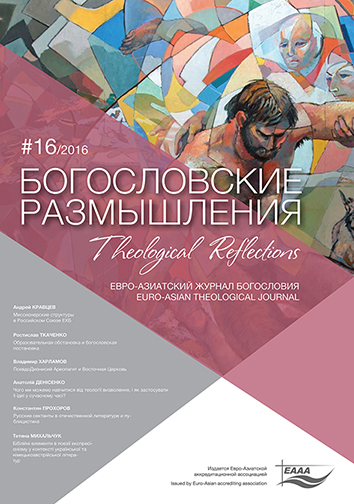Biblical Allusions in Expressionist Poetry in the Context of Austrian, German, and Ukrainian Literature: A Comparative Analysis
DOI:
https://doi.org/10.29357/issn.2521-179X.2016.16.206Keywords:
Biblical allusions, Biblical reminiscences, Biblical paraphrases, Comparative literature, Expressionism in poetry, Hamartiological, Pneumatological, Christological, Apocalyptic and eschatological motifs, European culture.Abstract
With the application of comparative methodology, this article analyzes biblical allusions, reminiscences, paraphrases, direct and indirect quotations, and symbols in the poetry of Austrian, German, and Ukrainian writers (Georg Heym, Mykola Bazhan, Mykola Khvyliovyj Todosii, T. Osmachka, Pavlo Tychyna, Georg Trakl, Stefan Zweig, Franz Werfel). It explores literary connections between interpretations of Old and New Testament quotations in the original languages (Hebrew and Greek) and poetry in the original languages (Ukrainian and German). Comparison of literary and biblical texts written in the original languages with literary and biblical texts in translation shows both similarities and significant differences in the interpretation of biblical elements. Hamartiological, pneumatological, Christological, apocalyptic, and eschatological motifs and their comparison with Ukrainian and German poetic texts are treated as a model of comparison for the transformation of categories of expression as one of the basic principles for many expressionist texts.References
- Bazhan, M. “Poezii ta poemy”. Bazhan, M. Tvory, in four volumes. Kyiv: Dnipro, 1984.
- Віblia Hebraica. Stuttgart: Deutsche Bieldenschaft, 1967.
- Chernenko, Oksana. Ekspresionysm u tvorchosti Vasylia Stefanyka [Expressionism in the Works of Vasyl Stefanuk]. München: Sychasnist’, 1989.
- Eykman, Christoph. Denk- Stiforen Expressionismus. München: Veerlag GmbH, 1974.
- “Georg Trakl: Gedichte – Verfall.” Spiegel Online Kultur. Project - Gutenberg-DE; <http://gutenberg.spiegel.de/buch/georg-trakl-gedichte-5445/23>
- Havryliv, О. “Expressionism ta emotyvnist iak movni katehorii” [Expressionism and emotionalism as language categories]. Expressionism: collection of academic works О. Havryliv. L: VNTL – Klasyka, 2004.
- Heym, Georg. “Der Gott der Stadt”. Die Deutsche Gedichte –Bibliothek. <http://gedichte.xbib.de/Heym_gedicht_Der+Gott+der+Stadt.htm>
- ___________. “Mitte des Winters.” Georg Heym. Der Himmel Trauerspiel; Die Deutsche Gedichte –Bibliothek. <http://gedichte.xbib.de/Heym_gedicht_Mitte+des+Winters.htm>
- ____________. “Umbra Vitae”. Die Deutsche Gedichte –Bibliothek.
- ____________. “Umbra Vitae”. Harper’s Magazine, Scott Horton, trans. <https://harpers.org/blog/2008/02/heyms-umbra-vitae/>
- Hvyliovyi M. “Mlity v polumjii vik, bez kintsiia”. Hvyliovyi M. Tvory: V piatiokh tomah, H. Kostiuk, ed., Vol. III. New York, Baltimore, Toronto: Ob’ednannia Ukrajintskyh pys’mennykiv “Slovo” and Ukrainian Publishing House “Smoloskyp” of V. Symonenka, 1982.
- ____________. “Uryvky”. Hvyliovyi M. Tvory: V piatiokh tomah, H. Kostiuk, ed., Vol. III. New York, Baltimore, Toronto: Ob’ednannia Ukrajintskyh pys’mennykiv “Slovo” and Ukrainian Publishing House “Smoloskyp” of V. Symonenka, 1982.
- Klaus, Strohmeyer. Zur Ästhetik der Krise. Frankfurt am Main; Bern; New York; Nancy: Lang, 1984.
- Mulrooney, Christopher. <http://cmulrooney.tripod.com/tongues679.html>
- Mykhalchuk, Tetiana. “Discourses of European Expressionisms (1889-1930)”. Vol. I, The Image of City in Expressionist Poetry of Twenty-Seven Countries. ‘s-Hertogenbosch: Uitgeverij BOXPress, 2014.
- ____________. “Transition and Reconciliation between Western and Eastern Europe through Unintentional Mediators”. Religion, State, Society, and Identity in Transition: Ukraine. Edited by Rob van der Laarse, Mykhailo N. Cherenkov, Vitality V. Proshak, and Tetiana Mykhalchuk. Oisterwijk: Wolf Legal Publishers, 2015.
- ____________. German Mediations in Reconciliation of Europe: Transnationalism of International Expressionist Scholarship after 1973. United PC Uitgeverij, 2014.
- Naydan, Michael M., trans. The Complete Early Poetry Collections of Pavlo Tychyna. Lviv: Litopys, 2000.
- New Testement into Greek. New York: New York Press, 1982.
- Osmachka, Teodosij. Iz pid swity [From under the world]. New York: Ukrainian Free Academy of Science in USA, 1954.
- Przybyszewski, Stanislaw. Povtorna Fala. Navkoło Ekspresjonizmu, Wybór Pism, oprac. Roman Taborski. Wrocław: Ossolinelum, 1906.
- Reich-Ranicki, Marcel. <http://holodrome.tumblr.com/post/6048176036/god-of-the-city-georg-heym-der-gott-der-stadt>
- Rubiner. Das himmlische Licht. München: Gedichte, 1970.
- Sydow von, Eckart. “Das religiöse Benußtsein als Expressionismus.” Theorie des Expressionismus. Stuttgart:Verlag, 1999.
- Trakl, Georg. Verfall [Decay]. <http://myweb.dal.ca/waue/Trans/Trakl-Verfall.html>.
- Tychyna, Pavlo, Tvory. Kyiv: Molod’, 1976.
- Vajda, György M.. “Outline of the Philosophic Backgrounds of Expressionism.” In Expressionism as an International Literary Phenomenon. 21 Essays and a Bibliography, ed. by Ulrich Weissrein. Co-Ordinating Comittee of Comparative History of Literatures in European Languages. Joint Edition: Librairie Marcel Didier, Paris, and Akadémiai Kiadó, Budapest, 1973.
- Werfel, F. “An den Leser.” <http://www.buecherlesung.de/pdf/An_den_Leser-Franz_Werfel.pdf>
- Zweig, Stefan. “Steigender Rauch.” Sinnende Stunde; Die Deutsche Gedichte –Bibliothek. < http://www.gutenberg.spiegel.de/buch/-6913/9>
Downloads
How to Cite
Issue
Section
License
Copyright (c) 2020 Tetiana MYKHALCHUK

This work is licensed under a Creative Commons Attribution-NonCommercial 4.0 International License.
All articles published in the Journal are distributed under a Creative Commons Attribution-NonCommercial 4.0 International License
By submitting an article for publication in Theological Reflections: Eastern European Journal of Theology the author grants the editors the right to publish the article and distribute it in electronic and print form.
The author reserves all copyrights and the right to use the materials of the article in whole or in part for educational purposes, to write his own dissertations, to prepare abstracts, conference reports, oral presentations, etc., as well as post electronic copies of articles (including the final electronic version downloaded from the journal’s official website) on non-commercial web-resources without the consent of the editorial board and founders.



